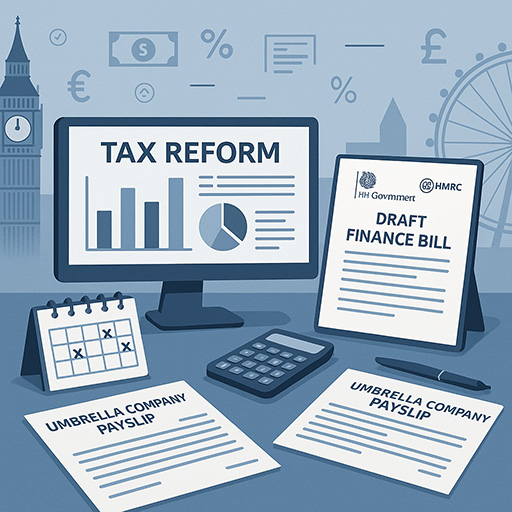Driven by growing concerns over substantial tax losses and unfair practices, Umbrella companies, a popular vehicle for contractors and temporary staff, are now being targeted by the government via a series of comprehensive reforms aimed at enhancing tax compliance.
As an intermediary solution that allows workers, particularly contractors and temporary staff, to be paid through a limited company without having to run their own business, Umbrellas are an attractive proposition. They handle payroll processing, tax deductions via PAYE, and NIC contributions. However, over time, practices within the umbrella company sector have come under scrutiny due to widespread non-compliance and the exploitation of tax loopholes.
The inability to secure proper tax payments has resulted in significant revenue losses for the Taxman, with estimates suggesting a £2.85 billion shortfall over the past five years.
Looking away from government tax shortfalls, the growing prevalence of non-compliant umbrella practices also places legitimate contractors at risk of bearing unexpected financial burdens.
So, what's the government's response to this?... It's a series of reforms to plug the umbrella tax gap and establish a more transparent, accountable framework under the draft Finance Bill 2025-26.
What the key change?
The key change is the introduction of joint and several liability. Under the new model, if an umbrella company fails to remit the requisite PAYE taxes or NICs, the burden of rectifying this shortfall will fall on linked entities, such as recruitment agencies or end clients that engage these companies. This shift in accountability is set to change the landscape, as all parties, including those who previously might have been insulated from direct responsibility, are now motivated to verify compliance.
We'll break down each of the changes for you:
-
Joint and Several Liability
The revised liability structure mandates that recruitment agencies or, in cases where no intermediary is involved, end clients, will be held jointly responsible for any shortfall in PAYE tax or NICs if an umbrella company does not properly fulfil its obligations. This paradigm shift is designed to incentivise due diligence at every level. With the liability spread it means the umbrella is less likely to break rules.
-
Formal Legal Definition of Umbrella Companies
To close existing loopholes, the legislation will introduce a clear and concise legal definition of what qualifies as an umbrella company. This step is critical for curtailing the operation of so-called "mini umbrella" schemes that have traditionally skirted regulatory oversight. By tightening the parameters, the government aims to create a level playing field whereby only genuine umbrella structures that comply with strict tax obligations can operate.
-
Responsibility in Multi-Agency Supply Chains
In the modern contracting environment, supply chains can involve multiple recruitment agencies. The new legislation stipulates that the agency positioned at the top of such a chain will be designated as the primary party responsible for ensuring that all tax contributions are appropriately made. This measure prevents any dilution of responsibility and fosters clearer accountability in complex contracting arrangements.
The government projects that these reforms will prevent around £900 million in unpaid taxes during the first year of operation alone. Estimates suggest that around 700,000 workers who operate through umbrella companies will be directly impacted by these changes.
Recruitment agencies and end clients will need to adjust their internal processes, contracts, and systems in order to remain compliant with the new legal framework.
Are the changes 'good' for contractors?
Previous non-compliance by umbrella companies has often resulted in contractors facing unpredictable tax bills. The new model, with its built-in measures for accountability, is anticipated to offer much needed protection for individuals, ensuring that any fiscal discrepancies are addressed at the agency or client level rather than being passed down to the worker.
Are the changes 'good' for umbrella companies?
By holding non-compliant operators to account, compliant umbrella companies and agencies will operate on a level playing field. This change is intended to foster an environment in which responsible businesses are not undercut by those who engage in fraudulent practices, thereby enhancing overall market integrity.
When does this all come into law?
The draft Finance Bill 2025-26, which lays out these umbrella company reforms, is currently undergoing the legislative consultation process. This is a critical phase during which feedback from stakeholders, industry experts, and affected parties is being considered. Once the legislative process is complete, the new regulations are scheduled to take effect on 6 April 2026. This provides a window of opportunity for all parties involved to review and adjust their practices in line with the new requirements.
Accurate tax calculations are more important than ever under the new regime. Tools such as our IR35 calculator and our contractor tax calculator can assist in estimating calculations, ensuring that deductions and contributions are in the right ballpark. These tools were designed to identify any errors before they become costly issues.


